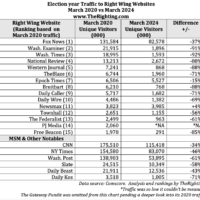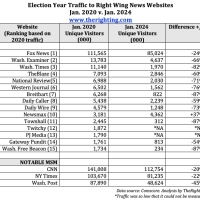
An Old Dog with New Tricks: At 89, Conservative Legend Richard Viguerie Is Still “Organizing Discontent” on the Far Right
By Michael Lovito, November 1, 2022
In 1961, a twenty-eight-year-old Texan was hired as the executive secretary of the Young Americans for Freedom, a conservative youth group that had been founded just one year prior. During his first day on the job, his new boss pointed him towards a list of 1,200 conservative donors and set him to work raising money for the young and occasionally unstable organization. After just three phone calls, he managed to raise $4,100.
So began the career of Richard Viguerie, one of the most influential figures in conservative organizing and fundraising, and, at 89, surely the grand old man of ultra-conservative journalism. Called the “godfather” of the New Right by author Rick Perlstein, Viguerie played a key role behind the scenes in the conservative movement’s takeover of the Republican Party. He was the link between a number of disparate interest groups that eventually coalesced behind Ronald Reagan and his ideological descendants.
And Viguerie is still active as the chairman of ConservativeHQ, a right-wing website that features calls to action just as provocative as the direct mail pleas Viguerie sent to voters in the 1970s and 80s. Snail mail may be a thing of the past, but Viguerie’s fingerprints are all over today’s polarized political discourse. With his embrace of the internet, he remains an influential figure on the right decades after he first dialed for those conservative dollars.
A Right Wing Rainmaker
A self-professed admirer of anti-communist demagogues like Joseph McCarthy and Douglas MacArthur, Viguerie (who didn’t respond to The Righting’s request for an interview) left Young Americans for Freedom in 1963 and went into business for himself, founding the Richard A. Viguerie Company (RAVCO) the following year. Taking advantage of a federal law that gave him access to the names of every person who donated at least $50 to arch conservative Barry Goldwater’s 1964 presidential campaign, Viguerie built a comprehensive database of conservative donors and activists and began contacting them on behalf of such clients as the American Conservative Union, Committee for the Survival of a Free Congress, and Gun Owners of America. While direct mail marketing had been used by labor unions and charitable organizations to solicit donations since World War II, Viguerie turned the practice into an art, “organizing discontent” (his own phrase) around issues like Martin Luther King Day, the Panama Canal treaty, and the AIDS epidemic.
“Viguerie turned direct mail into this universe with its own kind of characteristics and cadences,” said L. Benjamin Rolsky, an affiliated scholar with the Center for Cultural Analysis at Rutgers University who has written about Viguerie for The Washington Post and Post45. “The punchy writing, underlining, bolding, and italicizing certain words, it’s almost like he was bringing the page to life in a lot of ways.”
After generating hundreds of thousands of small donations for a wide array of conservative candidates and causes throughout the 60s and 70s, Viguerie quickly built a reputation as a right-wing rainmaker. A 1978 Atlantic article estimated his annual fundraising grosses at over $15 million a year. He was so good at his job, he even attracted the attention of staunch liberal George McGovern, who approached Viguerie about working for his 1968 presidential campaign. Noting their ideological differences, Viguerie politely declined.
How to Build a Coalition
Perhaps more important than the money Viguerie raised were the messages he disseminated. By pooling the mailing lists of his various clients, Viguerie could bring the pet issues of a religious group like the Moral Majority to the attention of anti-tax activists and bring anti-tax messaging to voters whose chief concern was abortion. This ideological cross-pollination allowed Viguerie to build a coalition of seemingly unrelated voters that would eventually help conservatives take over the Republican Party and, in the form of Ronald Reagan, the White House.
“He and this infrastructure he created, both of which are still going strong, helped shift concerns from Republican versus Democrat to liberal versus conservative, thereby kind of encouraging coalition-based politics,” Rolsky said. “So sometimes he’s just seen as a source of money, but he also cultivated a kind of blue-collar informed, at times abrasive, form of conservatism.”
Teeing Up the Trump Era
Ever the innovator, Viguerie recognized the internet as a tool for political persuasion early on, founding ConservativeHQ in 1999. More than just a source of right-leaning news, Viguerie has used ConservativeHQ as another medium through which he can rally readers to his (and his clients’) pet causes. While the website features articles with titles like “The Digital Lynching of Herschel Walker” and “The Real Story Behind Drag Queen Story Hour,” and aggregates stories from other conservative sites like The Epoch Times and American Greatness, it also prominently displays job listings for American Target Advertising (RAVCO’s current name) and donation links to conservative PACs. Some of the articles serve as calls to action themselves. One, titled “The Democratic Crime Wave Is On the Ballot,” provides readers with a list of talking points to use during talk radio call-in segments, while another urges readers to call the White House to demand that the Biden Administration ban TikTok.
ConservativeHQ’s writing staff, which is heavy on Republican political operatives, and the spare design of its features pages, make it clear that Viguerie is less interested in publishing compelling content than he is in converting readers into donors and grassroots organizers. If ConservativeHQ lacks subtlety and sophistication – and it does – there’s no denying the weight it derives from Viguerie’s status as an influencer, if you will, whose decades-long efforts helped shape our fraught political moment.
“I think the genre of direct mail, and the way it entertained and informed and offended, tilled the soil for Trump,” said Rolsky. “It didn’t directly cause Trump. But when I look at the way everyone wants to call everyone an a-hole, that kind of communication and abrasiveness, it was kind of pioneered by the direct mail of the ‘70s.”
Michael Lovito is a Brooklyn-based reporter and critic whose work has appeared in Salon, Brooklyn Magazine, Pavement Pieces, and The District. He also serves as editor-in-chief of the politics and pop culture website The Postrider. @MLovito
Interested in more news about right-wing media curated especially for mainstream audiences? Subscribe to our free daily newsletter.
Richard Viguerie, chairman of ConservativeHQ and a key force behind the conservative movement’s takeover of the Republican party. (Photo: Wikimedia)
























